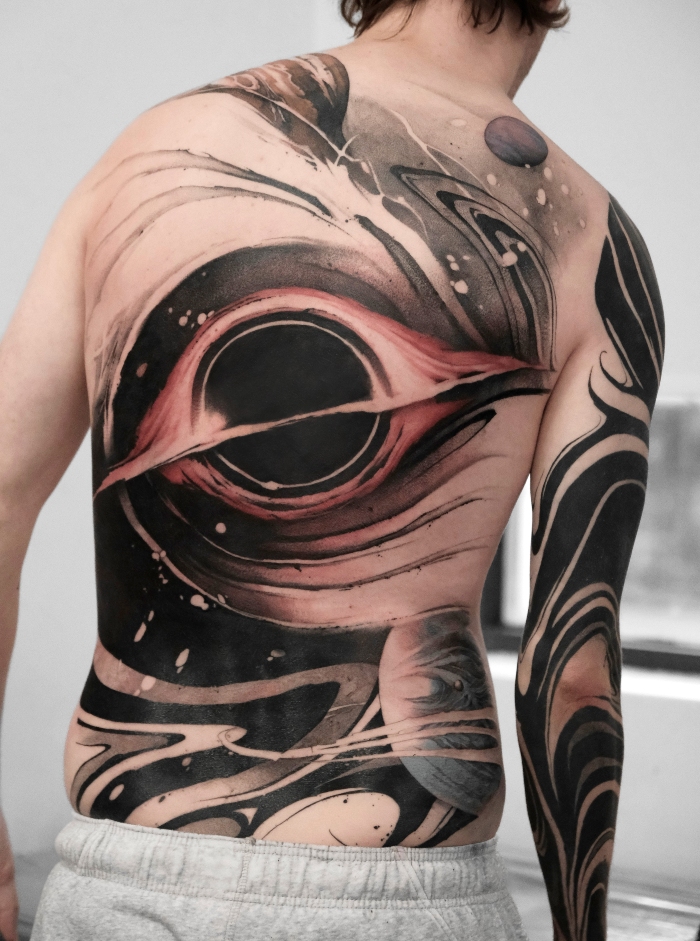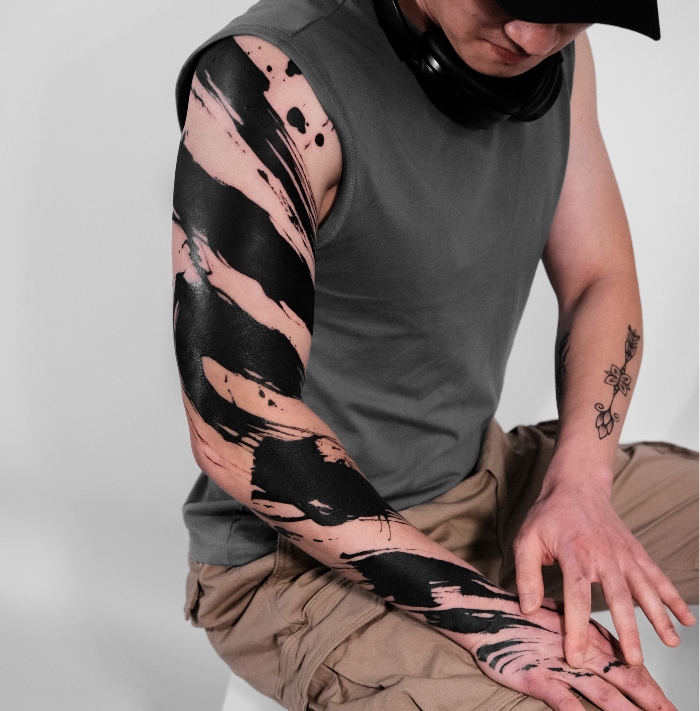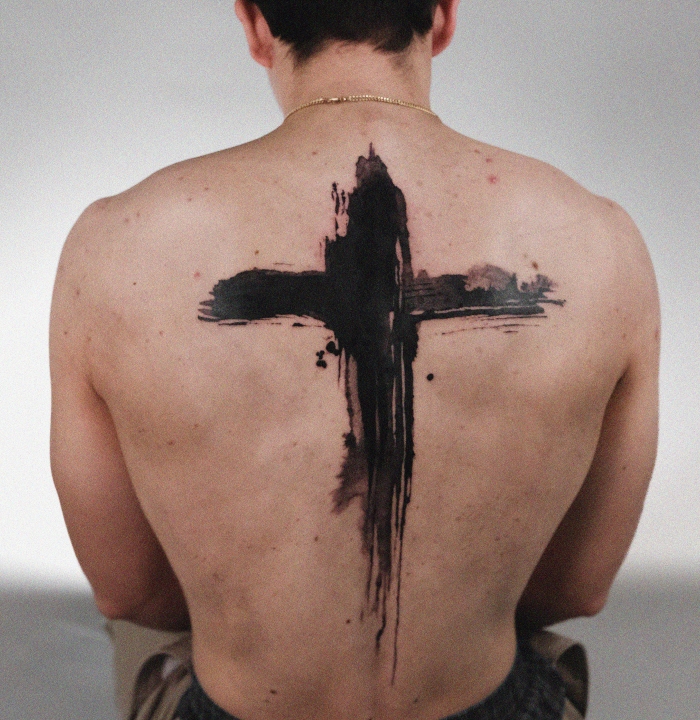Who is Ryu?
The name alone invites curiosity. Behind it is Jeong Ryunchae, a Korean tattoo artist who blurs the line between fine art and tattooing. Once an aspiring painter, Ryu traded canvas for skin, discovering in the human body a living, breathing medium for expression. Largely self-taught before apprenticing under Dino Oriental, he developed a signature language of monochrome abstraction fluid, bold, and unmistakably his own. Each piece evokes the spontaneity of ink on paper, transforming every stroke into emotion and movement.
Measured and disciplined yet intensely driven, Ryu stands among Korea’s new generation of tattoo artists; a movement that challenges convention while honoring its roots. Through his work, he turns the act of tattooing into a study of balance, intention, and art.
How would you like to introduce yourself to our readers?
I am Jeong Ryunchae, also known as Who is Ryu, from Korea.
Where did your fascination with tattoos come from?
I originally wanted to become a contemporary artist, but I guess I lacked the patience of someone like Van Gogh. Since I wanted to make money more quickly, I naturally became interested in tattoos, and now I am captivated by their charm, still learning day by day.
What do tattoos mean to you personally?
When I first started tattooing, it symbolized hope, but now it has become something I cannot live without something that stays in my mind all day long.
If you had to define yourself in one word, what would it be?
Ambiguity.
How would you describe the tattoo scene in Korea these days?
The tattoo scene in Korea feels quite chaotic these days. Legalization is just around the corner, but ironically, public perception of tattoos seems to be growing more negative. I hope tattoos in Korea can one day become part of mainstream culture, like music and fashion.
At what point in your life did you decide to become a professional tattoo artist?
While I was in art school, I decided I would pursue art even if it meant starving, but after actually experiencing that, I changed my mind. That was when I was 22.
How did your family react when you began your tattoo career?
They didn’t show much interest. They just let me do what I wanted.
Did you go through an apprenticeship? How was that experience?
I taught myself at first, practicing on my own for about six months. Then Dino Oriental invited me to join his studio crew, and I learned a lot during that time.
What was your first tattoo like?
My first tattoo was a self-tattoo, and it was really ugly. Along with other practice tattoos I did on myself, it’s still on my right thigh. Whenever I see it, it reminds me to stay humble, it’s my very first tattoo.
How would you define your tattoo style, and what led you to focus on it?
I specialize in brushstroke and abstract tattoos. Even before tattooing, I was drawn to monochrome painting in contemporary art. It looks simple, but the emotions expressed through technique fascinated me. That naturally led me to focus on abstract tattoos once I started tattooing.
How do you stay inspired creatively?
I often look for references whenever I can. I habitually observe spilled paint, stone patterns, or wood textures, and sometimes I take photos of them. I also sketch designs in my imagination while showering. I usually forget them afterward, but I believe they remain in my subconscious.
Are there tattoos you prefer not to do?
Fine-line mini tattoos are really difficult for me. Since I usually work on large-scale pieces, smaller tattoos actually feel more challenging.
Where can clients find you?
I am currently at Blah Tattoo Studio in Melbourne, and I will soon be moving to Perth.
What does your daily routine look like as a tattoo artist?
I usually start my booked sessions around 11 a.m., then spend about two hours at the gym in the evening. Afterward, I work on my next designs at home and dedicate the rest of my time to self-development.
What’s one surprising thing about being a tattoo artist?
It is surprisingly free, yet there is also an endless amount of work to do.
What has been the most challenging aspect of being a tattoo artist in 2025?
Starting MooRee with my friends. It’s still in the early stages, but I think it will allow me to explore beyond tattoos, into clothing, artworks, and merchandise.
What tools and machines do you prefer?
I currently use FK’s Flux Max 4.5mm machine, Cartiel needles, and Emalla second skin. They are all top-quality tattoo supplies.
Do you have sponsors? If so, what can you tell us about them?
I’m sponsored by Cartiel for their cartridge needles and Emalla for their second skin. Cartiel’s cartridges are sturdy and beautiful, and they maintain their condition even during long sessions. Emalla second skin feels soft like real skin with no discomfort. It stretches well without pulling on the skin. It’s the best product for tattoo protection.
What do you think is the most important tattoo ethic for an artist?
I believe the most important ethic is always having the mindset to learn. New tattoo styles, techniques, hygiene practices, and products are constantly emerging. You must stay open-minded and willing to learn in order to keep progressing.
What’s your favorite way to keep learning as an artist?
Whenever I feel technical limitations, I try to focus on the basics rather than rushing to learn new tricks. Over time, I believe this builds more complete tattoo skills. I also enjoy photography, so I practice that sometimes too—it helps me train my eye.
Do you enjoy teaching or mentoring new artists?
I don’t think I have much talent for teaching. Since I learned tattooing on my own, I feel I lack the detail needed to teach others. Maybe after more theoretical study, I could give it a try.
What habits or routines help you stay focused and perform at your best?
I don’t drink, and recently I quit smoking to improve focus and health. During work, I avoid distractions, and even during breaks I think about what I’ll do next, such as which needle to use. But ultimately, taking care of both physical and mental health is the best way to maintain peak performance.
Do you usually do guest spots? If so, what were those experiences like?
Yes, I’ve done many guest spots. There was always nervousness working in new environments, but the studios and clients welcomed me warmly. Those experiences were great opportunities, and I grew a lot by learning from the tattoo cultures of different countries.
What do you think about the growing acceptance of tattoos in society?
I think the growing interest in tattoos is good for tattoo artists. Creating in complete indifference can feel very lonely.
What is the biggest misconception clients may have about tattoos?
Some clients think every tattoo must have a deep meaning. But there are many tattoos that are simply beautiful designs without carrying any special meaning.
Are you working on any other projects within the tattoo industry?
I recently started a creative group called MooRee with my friends. We plan to explore clothing, jewelry, artworks, and much more beyond tattooing.
What are your goals or dreams for the near future?
My immediate goal is to broaden my activities through MooRee.
What has your experience at tattoo conventions been like?
From early on, I participated in tattoo conventions in places like Thailand and Korea. Seeing so many artists gather, compete, and give their best motivated me to push harder. At the end of the three-day conventions, I could feel that I had grown.
How do you usually prepare for a convention?
Since I prefer competing at conventions, I create designs and find models in advance. I also prepare artworks, stickers, and clothing, … anything that can showcase who I am.
What is your main reason for attending conventions?
The passionate atmosphere brings excitement to what can sometimes feel like a monotonous routine. Winning is great, but even losing becomes a chance to push myself further.
Have you had the chance to compete in contests? Please share your awards if any.
I’ve competed twice in Korea and once in Melbourne, and I won twice. Ten months after I started tattooing, I won First place in Linework at a Korean convention, and in 2024 I won Best of the Day in Melbourne.
What do you consider your greatest achievements as a tattoo artist?
My biggest achievements are winning awards at conventions and meeting my wife, whom I later married.
What advice would you give someone considering a career as a tattoo artist?
Stay strong, everyone!
What do you think about the rise of AI in tattooing?
I think integrating AI into tattooing is a good idea. It can generate references without copyright issues, which is very helpful for Black-and-Grey and Realistic designs. In the future, AI tattoo design programs or AI tattoo machines might become widespread. If that happens, maybe I’ll still be able to earn a living as a tattooist even in old age. It’s fascinating to think about
What kind of legacy would you like to leave as a tattoo artist?
I simply want to be remembered by many people.
To wrap up this interview, what final message would you like to share with readers?
Have a happy day.













Leave A Comment